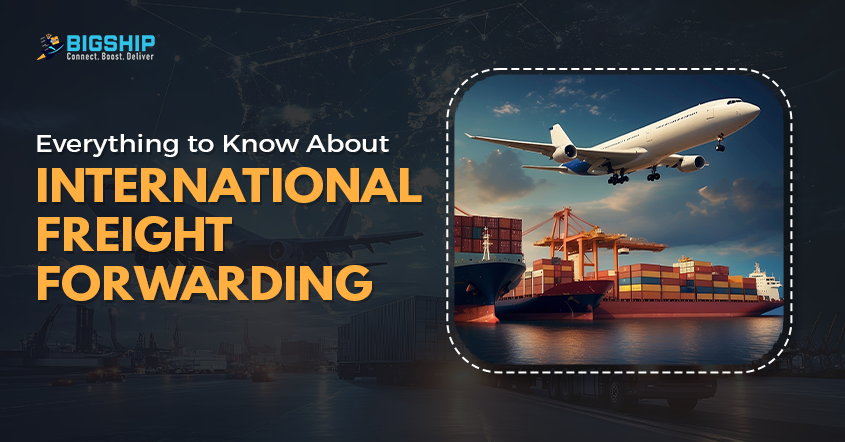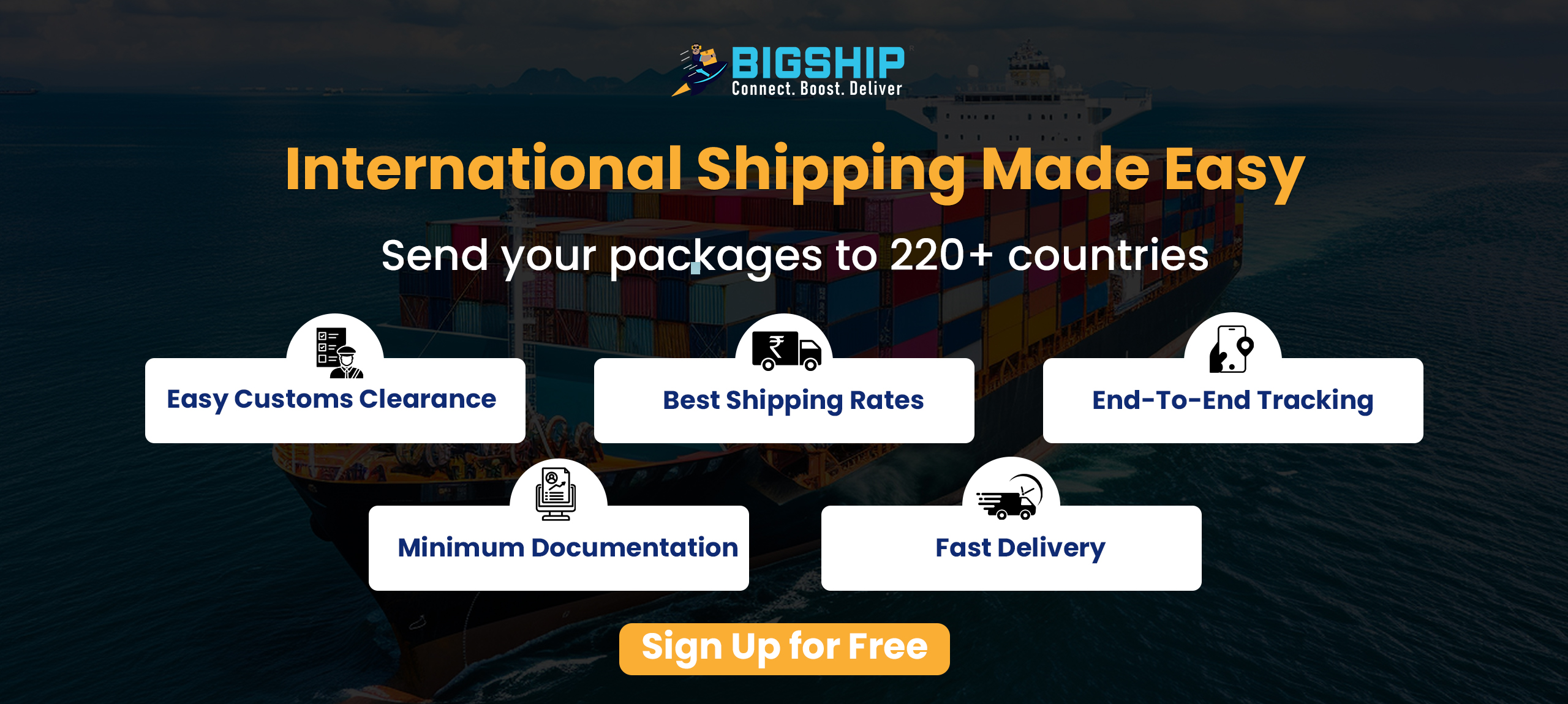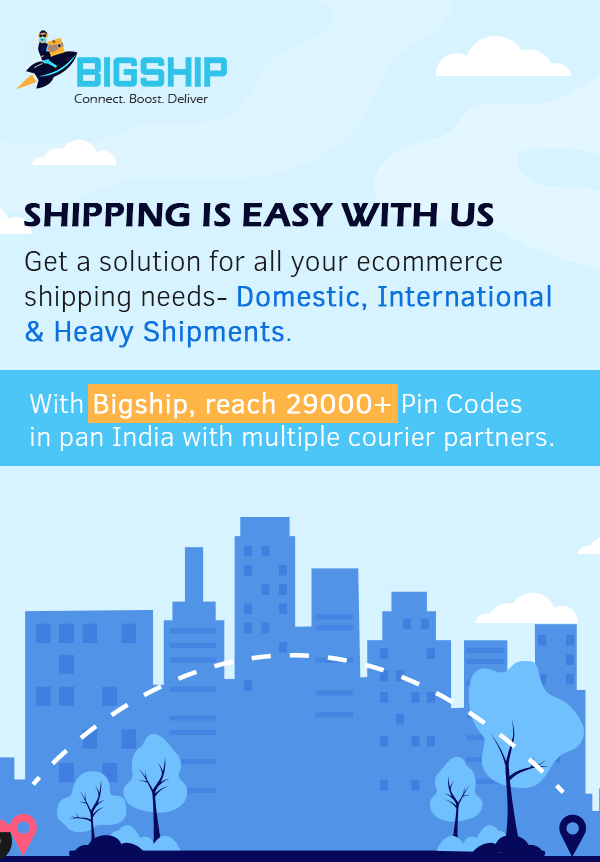A Complete Guide to International Freight Forwarding

2. Key Distinction Between Freight and Logistics
3. Different Types of Freight
4. How Do International Freight Forwarders Work?
5.Advantages of International Freight Forwarding
6.Challenges Faced in International Freight Forwarding
7. Bigship’s International Freight Forwarding Services
8. FAQs
International freight forwarding is the process of organizing and coordinating the transportation of goods across international borders. Freight forwarding companies act as intermediaries as they manage the logistics of shipping, documentation, customs clearance, and delivery. Their goal is to ensure that goods reach their destination safely and efficiently by making domestic as well as international trade smoother for businesses of all sizes.

In 2023, the international freight forwarding market was valued at USD 112.1 billion and is expected to grow at a rate of over 4.5% between 2024 and 2032. The overall freight forwarding market, valued at USD 191.6 billion in 2022, is also projected to grow at 4% over the same period, driven by global trade and economic growth in emerging markets.
In this blog, we’ll explore the role of freight forwarders, types of freight, how international freight works, and its advantages.
Role of Freight Forwarders in International Shipping
Freight forwarders play a key role in ensuring smooth international trade by handling the logistics of shipping goods across borders. Freight forwarding companies offer international freight forwarding services that simplify the movement of goods and makes it easier for businesses to engage in global trade. Some of the key roles of freight forwarders are mentioned below.
Securing Best Freight Rates: Freight forwarders negotiate with carriers to secure the most cost-effective freight rates. By balancing factors such as cargo type, space needs, and flexibility, they strike the best deals on behalf of their clients.
Monitoring Shipments: One of the primary duties of a freight forwarding service is tracking shipments. Using advanced tools like a Transportation Management System (TMS), they maintain visibility at every stage of the shipping journey. This allows them to monitor the location of goods in real time.
Organizing Warehouse Solutions: Freight forwarders also arrange for warehouse storage near ports or shipping locations. The distance to the warehouse is crucial as shorter distances reduce transport time and cost. Some forwarders even offer their own warehouses for storing goods, making the shipping process more convenient.
Coordinating Cargo Space: Another important role is arranging cargo space. Freight forwarders plan and schedule space for shipments to ensure that the cargo is efficiently consolidated.
Consolidating Shipment: For shippers with smaller loads, freight forwarders consolidate shipments into one container. This practice, known as Less-than-Container Load (LCL), allows several customers to share the container, by splitting the costs based on the cargo space they use.
Providing Cargo Insurance: Finally, freight forwarders offer cargo insurance to ensure that the shipper is protected in case of damage or loss during transit. This freight insurance helps businesses mitigate risks and safeguard their goods throughout the shipping journey.
Managing Customs Brokerage: Customs brokerage is a critical part of international freight forwarding. Only licensed customs brokers can handle the complex paperwork required for importing and exporting goods. Freight forwarding companies ensure they have licensed brokers to manage this essential aspect.
Key Distinction Between Freight and Logistics
Freight and logistics are often used interchangeably, however, they are different. The main differences between both are mentioned below.
| Freight | Logistics |
| Freight refers to the method of transporting goods, including air and ocean freight. | Logistics involves the entire process of moving goods from one point to another through a supply chain. |
| Deals with how goods are moved and focus on transportation modes used in freight forwarding services. | Focuses on the coordination of all processes involved in moving goods, from warehousing to delivery. |
| Selects transportation modes for international freight forwarding services. | Manages the entire movement of goods, from sourcing to delivery, including all related services. |
| Freight forwarding service providers handle transportation of goods. | Logistics providers handle the entire supply chain, ensuring smooth operations from start to finish. |
Different Types of Freight
Freight comes in various forms, each suited for different transportation needs. Here are four standard types of freight:
Air Freight: Air cargo is the fastest method of international freight forwarding, ideal for time-sensitive shipments. It’s commonly used for high-value or perishable goods.
Ocean Freight: It is a cost-effective option for large, bulky shipments. It’s widely used in international freight forwarding services for transporting goods across long distances.
Rail Freight: Rail freight is efficient for transporting heavy or bulk goods over long distances on land. It offers a reliable alternative for freight forwarding services.
Road Freight: It is highly flexible, making it ideal for domestic and cross-border shipments. It’s commonly used for last-mile deliveries in the freight forwarding process.
How Do International Freight Forwarders Work?
Freight forwarders play a crucial role in simplifying international freight forwarding for businesses. They act as intermediaries between shippers and carriers. Freight forwaders handle the entire shipping process from start to finish. Here how the entire process of freight forwarding works:
Process of Freight Forwarding
Client Evaluation and Mode Selection: The freight forwarder starts by assessing the client’s credit and discussing shipping options, such as air or ocean freight, based on the client’s needs.
Cargo Analysis: After choosing the mode of transport, the forwarder analyzes the cargo’s specifications, weight, and dimensions. This helps determine whether to use Less-than-Container-Load (LCL) or Full-Container-Load (FCL) services.
Cost Calculation and Documentation: The freight forwarder calculates the shipping costs and verifies all necessary paperwork. They ensure proper documentation is ready.
Shipment Scheduling: Once everything is in order, the forwarder schedules the transportation and begins tracking the shipment by keeping the client updated on its status.
Customs Clearance and Final Delivery: When the shipment reaches customs, the forwarder handles clearance procedures. After customs approval, they arrange transportation to the final destination and issue an invoice upon delivery.
Advantages of International Freight Forwarding
International freight forwarding offers businesses a streamlined process for shipping goods globally, with numerous benefits and services.
Simplifies the Process: Freight forwarders make the complicated process of international freight forwarding easy and efficient, especially for bulk orders.
One-Stop Solution: Freight forwarding companies offer all necessary services under one roof, including warehousing, insurance, customs documentation, and real-time shipment tracking.
Saves Time and Prevents Delays: By managing the entire shipping process, freight forwarders help businesses save time and avoid potential delays in international freight forwarding.
Wide Network Access: Established freight forwarding companies have strong global connections, ensuring reliable and efficient transportation across various countries.
Customized Solutions: Freight forwarders provide tailored solutions, from handling temperature-sensitive goods to managing oversized cargo and multi-modal shipments.
End-to-End Service: Freight forwarders offer complete service, from picking up goods to safe delivery.
Challenges Faced in International Freight Forwarding
International freight forwarding services face several key challenges today. Some of these are mentioned below.
Geopolitical Instability: Conflicts in regions like the Red Sea can disrupt shipping routes, forcing freight forwarders to find new solutions quickly to avoid delays.
Sustainability Regulations: The push for eco-friendly practices is leading to new regulations on emissions and fuels. Implementing these changes can be expensive and complex.
Slow Tech Adoption: In today’s digital era, freight forwarders must incorporate technology into their operations by utilizing real-time shipment tracking and AI to optimize routing. However, for many freight companies, this could be a complex process.
Evolving Consumer Demands: The changing consumer behaviors, driven by social media and e-commerce, create pressure on the freight industry to offer faster and more flexible shipping options.
Bigship’s International Freight Forwarding Services
Bigship offers reliable freight forwarding services to over 220 countries and territories. It ensures a smooth experience for global businesses with affordable rates, both air and sea freight options, real-time tracking, door-to-door delivery, and fast shipping. Whether you’re shipping small packages or bulk orders, Bigship’s services are designed for efficiency and convenience.
To start using Bigship’s international freight forwarding services, sign up here and simplify your global shipping process.
FAQs
Ques: What are the various modes of freight forwarding available?
Ans: The various modes of freight forwarding available are:
- Air Freight
- Ocean Freight
- Rail Freight
- Road Freight
Ques: What are the benefits of international freight forwarding?
Ans: The benefits of international freight forwarding are mentioned below:
- Provides access to global network
- Simplifies the complex process of freight forwarding
- It provides end-to-end service, from door pickup to door delivery
- Provides a complete range of services in one place
Ques: What is the difference between freight and logistics?
Ans: Freight refers to the actual goods being transported, while logistics involves the planning, execution, and management of moving those goods from one location to another.




